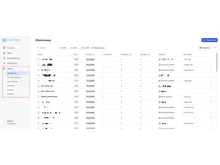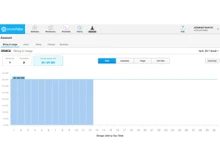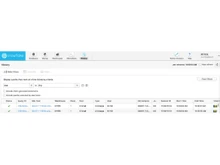Oracle Autonomous Data Warehouse vs Snowflake
Oracle Autonomous Data Warehouse is a self-driving, self-securing, and self-repairing cloud data warehouse. It automates many of the routine database management tasks. ADW is built on Oracle's database technology and leverages machine learning to deliver automated optimization, security, and maintenance. This platform provides enterprise-grade performance and reliability.
Snowflake is a cloud-native data warehouse platform. It separates compute and storage resources, allowing independent scaling of each component. This platform offers a multi-cluster shared data architecture. This structure enables concurrent access to a single copy of data, with built-in features for data sharing.
Snowflake vs Autonomous Data Warehouse: Pros and Cons
- While Snowflake supports partial automation, ADW has fully automated database operations and tuning reduces administrative overhead.
- Autonomous Data Warehouse offers zero downtime maintenance and updates.
- Oracle ADW consists of built-in machine learning capabilities.
- Snowflake provides multi-cloud deployment options (AWS, Azure, GCP).
- Autonomous Data Warehouse only works in Oracle infrastructure.
- Snowflake provides native support for semi-structured data.
Key Differences between Oracle Autonomous Data Warehouse and Snowflake
The following list of differences between Snowflake and Autonomous Data Warehouse can assist you in determining which is better:
| Comparison of Oracle ADW vs. Snowflake |
| Feature |
Oracle ADW |
Snowflake |
| Architecture |
Integrated architecture |
Distributed multi-cluster architecture |
| Tuning |
Automated |
Manual |
| Automation |
Full automation of routine tasks |
Partial automation with manual optimization options |
| Deployment |
Oracle Cloud Infrastructure (Serverless, Dedicated, Globally Distributed) |
Multi-cloud (AWS, Azure, GCP) |
| Data Processing |
Optimized for structured data |
Native support for semi-structured data |
| Scaling |
Automatic scaling with limited manual control |
Independent scaling of compute and storage |
| Security |
Advanced security features and automated patching |
Standard security features and manual security configurations |
| Maintenance |
Automated maintenance and self-repair |
Manual maintenance required |
| Cost Model |
OCPU-based pricing (Traditional licensing model) |
Pay-per-second pricing (Usage-based cost model) |
Detailed Comparison of Snowflake and Autonomous Data Warehouse (ADW)
- Data Types: Oracle Autonomous Data Warehouse handles structured data well and provides native support for JSON, XML, and spatial data. Snowflake, on the other hand, offers superior semi-structured data handling (JSON, XML, Avro, Parquet). It provides better structured and semi-structured data handling than ADW.
- Scalability: ADW automatically scales based on workload to accommodate growing data volumes and increasing query complexity. Whereas, Snowflake follows independent scaling of compute and storage with multiple virtual warehouses.
- Performance: ADW prioritises advanced query optimization with machine learning and quickly retrieves and processes data. In contrast, Snowflake provides consistent performance with isolated compute resources.
- Deployment Model: Snowflake provides a more flexible approach with multi-cloud deployment options across AWS, Azure, and Google Cloud Platform. It allows organisations to choose their preferred cloud provider or implement a multi-cloud strategy. Oracle Autonomous Data Warehouse (ADW) operates exclusively within Oracle Cloud Infrastructure (OCI).
- Data Integration Capabilities: While Snowflake adopts a comprehensive strategy by supporting third-party tools and platforms, Oracle ADW's integration is firmly anchored in the Oracle ecosystem. Snowflake supports standardised connectors and APIs, including Tableau, Power BI, and Informatica. Alternatively, ADW’s technology stack prioritises native integration with Oracle Analytics Cloud, Data Integrator, and GoldenGate.
- Ease of Use: Autonomous Data Warehouse simplifies management through automation of complex database operations. Handling performance tuning and managing storage are easy with ADW. Snowflake provides an intuitive interface with familiar SQL-based operations. It focuses on a clear separation of storage, computing, and cloud services.
- Maintenance Requirements: Oracle ADW achieves near-zero maintenance through automation of routine tasks, including database tuning, patching, upgrades, and backup operations. While Snowflake requires minimal maintenance but retains some manual optimization options. It allows administrators to control resource allocation and performance tuning.
Snowflake & Autonomous Data Warehouse: Data Integrity & Security
Both platforms prioritize data security but approach it differently. ADW provides automated security patching and encryption with Oracle's Maximum-Security Architecture. Whereas, Snowflake offers end-to-end encryption, secure data sharing, and role-based access control with SOC 2 Type II compliance.
Oracle ADW vs Snowflake: Vendor Support
Oracle provides comprehensive enterprise support with dedicated technical account managers for ADW customers. In contrast, Snowflake offers standard and premium support options with varying response times and dedicated resources based on the service tier.
Snowflake or Autonomous Data Warehouse: Pricing
These platforms provide pricing like “pay-as-you-go” system where you only pay for computing, processing, and storing data. It is similar to electricity units. The data warehousing units are known as ECPU.
Autonomous Data Warehouse (ADW) offers two billing models—Single Database and Elastic Pool in Analytics and Data Warehousing workload type. It provides flexible options to enterprises to choose between deployment type and licensing which affects pricing.
Snowflake provides the option of choosing regions and platforms among three—AWS, Azure, and GCP. Depending on these choices and 4 plans, i.e., Standard, Enterprise, Business Critical and Virtual Private Snowflake (VPS) pricing is decided.
Which is Better—Autonomous Data Warehouse or Snowflake?
The choice between Autonomous Data Warehouse and Snowflake depends on specific organizational needs. However, you can choose ADW if you have a significant investment in Oracle technologies. Its automated management and enterprise-grade security are highlights of this platform. On the other hand, you can choose Snowflake if you have multi-cloud deployment requirements and want flexible scaling and pricing. It also supports semi-structured data handling as compared to Oracle ADW.


 1 Ratings & 1 Reviews
1 Ratings & 1 Reviews




















